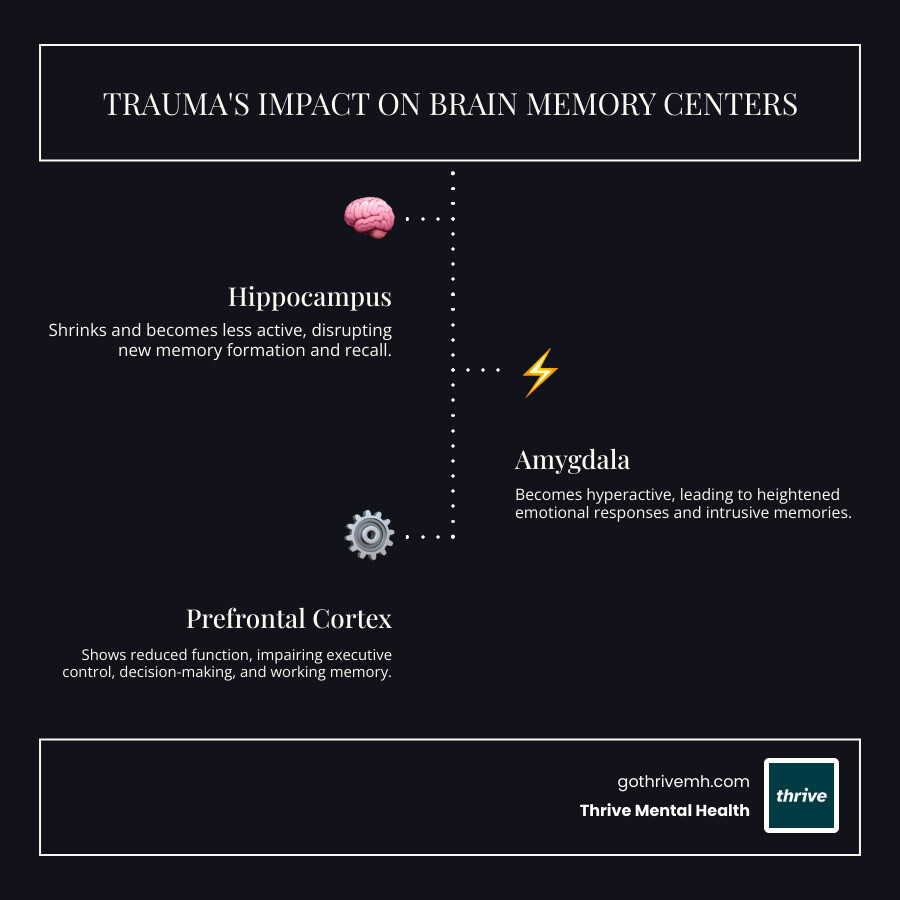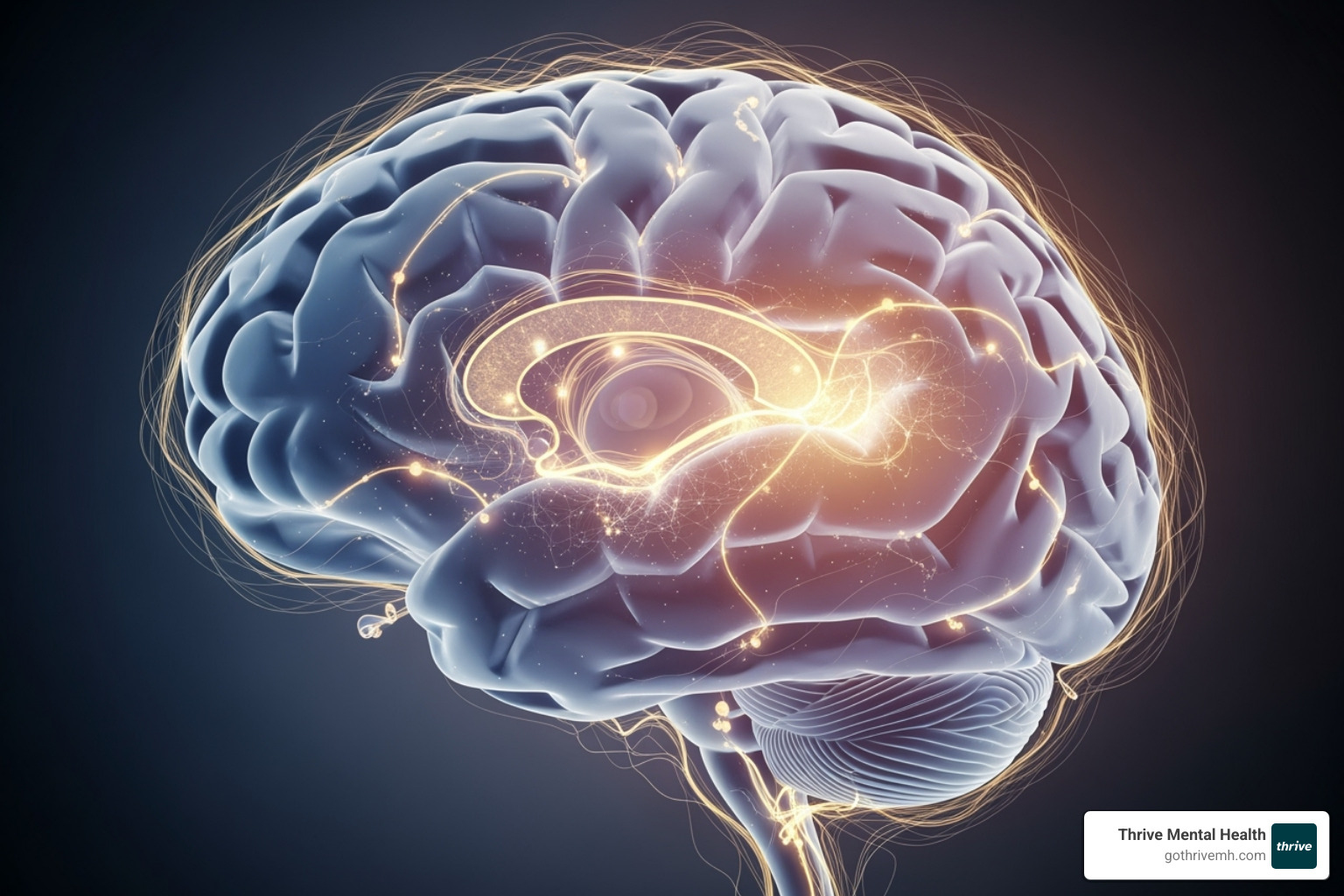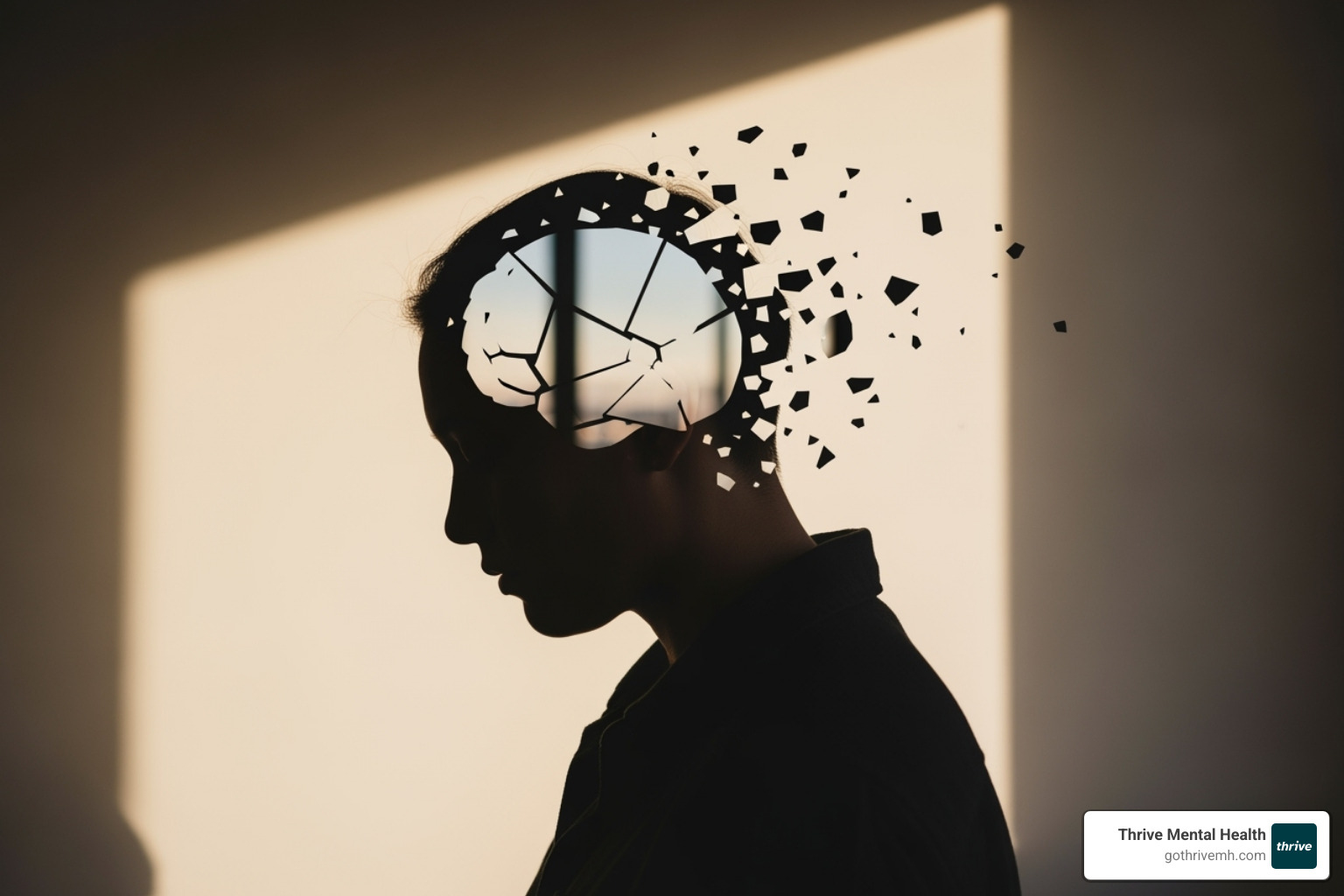When Trauma Erases Memories – Understanding Dissociative Amnesia

When Your Mind Protects You: How Trauma Affects Memory
Can trauma cause memory loss? Yes, trauma can significantly impact memory, leading to anything from temporary forgetfulness to complete gaps concerning traumatic events.
Quick Answer:
- Physical trauma (like head injuries) can damage brain areas responsible for memory
- Psychological trauma triggers stress responses that disrupt memory formation
- Dissociative amnesia causes gaps in personal memories as a protective mechanism
- PTSD affects both traumatic memories and everyday memory function
- Memory problems range from mild forgetfulness to complete loss of personal history
Your mind has an incredible ability to protect you from overwhelming experiences. When faced with trauma, your brain may “hide” painful memories or disrupt the memory formation process. This isn’t a sign of weakness—it’s a survival mechanism.
Memory loss after trauma can be confusing and frightening, affecting an estimated 0.2 to 7.3% of the general population through dissociative amnesia alone. The relationship between trauma and memory is complex, as stress hormones alter key brain regions like the hippocampus (memory formation), amygdala (emotional processing), and prefrontal cortex (executive function).
As Nate Raine, CEO of Thrive Mental Health, I’ve seen how trauma-induced memory loss impacts our clients’ lives across Florida. Understanding this connection is often the first step toward healing, which is a core focus of our behavioral health programs.

Must-know can trauma cause memory loss terms:
How Can Trauma Cause Memory Loss? The Brain Under Stress
When trauma strikes, your brain enters survival mode. The question “can trauma cause memory loss” becomes very real as stress hormones trigger an intense fight-or-flight response. This reaction, while protective, can seriously disrupt how your brain forms and stores memories, prioritizing immediate survival over careful documentation.

Three key brain areas are most affected during traumatic experiences:
The hippocampus, your brain’s memory filing cabinet, can shrink in adults with PTSD, making it harder to form clear, organized memories. Research shows this change may develop over time, as it isn’t seen in children with PTSD.
Your amygdala, the brain’s alarm system, becomes hyperactive during trauma. This emotional overload can override normal memory formation, leaving you with fragmented or distorted recollections.
The prefrontal cortex, which handles working memory, is flooded with stress hormones like glucocorticoids and catecholamines. This impairs your ability to think clearly, process new information, or retrieve memories effectively.
These changes occur because trauma disrupts the body’s hypothalamic-pituitary-adrenal (HPA) axis—your central stress response system. Scientific research on brain abnormalities in PTSD has documented how these neurobiological changes contribute to memory problems.
The Impact on Different Memory Types
Can trauma cause memory loss across different types of memory? Yes, and the effects vary. Short-term memory can be impaired, making it hard to recall recent information. Long-term memory may become fragmented, like a puzzle with missing pieces. Working memory is also challenged, making tasks like following a conversation difficult. Trauma can also affect prospective memory (remembering to do things), emotional memory (leaving you with feelings disconnected from events), and even procedural memory (automatic skills like typing). For more on this, you can explore understanding different types of memory.
Pre-existing Vulnerabilities and Risk Factors
Your brain’s condition before trauma matters. Twin studies show that people with pre-existing memory deficits or smaller hippocampal volumes may be more vulnerable to developing PTSD after trauma. This can create a “downward spiral” where PTSD worsens existing memory issues, creating a cycle that’s difficult to break without professional help.
This highlights why individualized, expert-led treatment is so important. At Thrive Mental Health, we understand that everyone’s brain responds differently to trauma, which is why our evidence-based programs in Florida are customized to each person’s unique needs and cognitive profile.
Understanding Trauma-Related Amnesia and PTSD
When people ask “can trauma cause memory loss,” they’re often thinking about the mysterious memory gaps that can follow overwhelming events. Your mind can protect you by “hiding” memories that feel too painful to bear.

It’s important to distinguish between neurological amnesia, caused by physical brain damage (like a head injury), and dissociative amnesia, a psychological defense where the mind blocks memories without structural brain damage.
| Feature | Neurological Amnesia (e.g., from TBI) | Dissociative Amnesia (from psychological trauma) |
|---|---|---|
| Cause | Brain injury (stroke, TBI, infection, oxygen deprivation, disease) | Psychological distress, severe trauma, emotional shock, internal conflict |
| Brain Damage | Direct physical damage to brain structures | No structural brain damage; functional disruption |
| Memory Affected | Often difficulty learning new information (anterograde), recent memories most affected, can be global | Personal/autobiographical memories (facts, experiences about oneself) |
| Awareness | Individuals typically aware of memory problems | Often unaware of memory gaps until prompted by others |
| Identity | Identity usually retained | Can involve loss of personal identity (global amnesia or dissociative fugue) |
| Duration | Can be temporary or permanent, depending on severity of injury | Can last minutes to years; often resolves spontaneously, but can be persistent |
Dissociative Amnesia: The Mind’s Escape
Dissociative amnesia is a psychological defense mechanism where you can’t recall important personal information, usually related to trauma. The forgotten information is still there and can influence your behavior, even if you don’t consciously know why. It can manifest as forgetting a specific time period (localized amnesia), some events but not others (selective amnesia), or, in rare cases, your entire life history (generalized amnesia). In the most severe form, dissociative fugue, a person may travel away from home and assume a new identity with no memory of their past. Many people are unaware of their memory gaps until pointed out by others. For more details, you can explore information on dissociative disorders.
How PTSD Affects Memory
Post-Traumatic Stress Disorder (PTSD) creates a confusing relationship with memory. You might be haunted by intrusive memories (vivid flashbacks) while simultaneously struggling to remember everyday things. This isn’t a lack of caring; it’s your brain managing an overloaded system. Research shows that verbal memory is particularly affected, especially in war veterans. This is due to both biological factors, like stress hormones damaging the brain, and psychological coping strategies like avoidance. For those with Complex PTSD from prolonged trauma, memory issues can be even more severe. A meta-analysis on memory deficits in PTSD offers deeper insights.
The Role of Specific Traumas
Different traumas impact memory differently. Traumatic Brain Injury (TBI) often impairs the ability to form new memories, a condition called post-traumatic amnesia. You can learn more about memory problems after TBI. Childhood trauma can affect how the entire memory system develops. Combat trauma often leads to severe verbal memory issues due to prolonged hypervigilance. Intimate partner violence and other chronic traumas can cause memory fragmentation. Even emotional trauma without physical injury can cause significant memory loss, as the brain’s survival response doesn’t distinguish between physical and emotional threats.
Living with Trauma-Related Memory Gaps
When can trauma cause memory loss becomes your reality, the effects are far-reaching. It’s more than just misplacing keys; it can fracture your sense of self and strain your relationships.

When gaps appear in your life’s narrative, you might feel like pieces of yourself are missing. Relationships can suffer when loved ones don’t understand why you can’t recall shared moments, and you may feel hurt or confused by their reactions. Daily life requires extra mental energy, and situations like legal or medical appointments can become complicated when you can’t provide a clear history.
What are the signs that trauma can cause memory loss?
Recognizing trauma’s effect on your memory can be subtle. Key signs include:
- Feeling persistently disoriented or confused about recent events.
- Finding unexplained gaps in your personal history.
- Difficulty recalling important life events, not just the trauma itself.
- Others mentioning conversations or events you have no memory of.
- Forgetting learned skills or information that was once familiar.
Coping Strategies and Lifestyle Changes
Living with memory gaps requires patience and practical strategies. While professional treatment is key, these changes can help.
-
Use memory aids: Employ calendars, smartphone apps, voice recorders, and notepads. Create a designated “memory station” near your door for essentials like keys, wallet, and phone to reduce daily frustration.
-
Establish routines: Consistency reduces the mental energy needed for daily tasks, freeing up cognitive resources and minimizing forgetfulness.
-
Prioritize sleep: Quality sleep is crucial for memory consolidation, the process of storing memories for the long term. The role of sleep in memory consolidation is well-documented.
-
Manage stress: Techniques like mindfulness, meditation, or deep breathing can calm your nervous system and improve your ability to focus and remember.
-
Stay active: Mental and physical activity supports overall brain health. Reading, puzzles, and exercise increase blood flow to the brain and support cognitive function.
-
Ask for support: Let trusted friends and family know about your challenges. Their understanding and assistance can make a significant difference.
These strategies are about reclaiming a sense of control. Combined with professional support, they can help you build a life that works for you, even with memory challenges. For those in Florida seeking trauma therapy, our programs offer the expert guidance needed to steer this journey.
Pathways to Healing and Memory Recovery
The journey of healing from trauma-induced memory loss is hopeful. When trauma can cause memory loss, the effects are not necessarily permanent. The goal isn’t to force every memory to return, but to process what happened and integrate your experiences into a cohesive life story.
Professional help is essential. A skilled therapist provides a safe space to reconnect with memories without feeling re-traumatized. The focus is on healing the emotional wounds, which often improves memory function as a natural result.
How therapy helps when trauma can cause memory loss
Therapy offers a lifeline when trauma disrupts your memory. Different approaches share the goal of promoting safety and healing.
- Cognitive Behavioral Therapy (CBT) helps challenge negative thought patterns that interfere with memory.
- Eye Movement Desensitization and Reprocessing (EMDR) uses guided eye movements to help the brain process and organize traumatic memory fragments.
- Prolonged Exposure (PE) therapy involves gradually confronting trauma-related memories and situations you’ve been avoiding.
- Somatic Experiencing helps release physical stress responses stuck in the nervous system after trauma.
- Dialectical Behavior Therapy (DBT) teaches skills for managing intense emotions and staying present, which can be impaired by dissociation.
A crucial aspect of any treatment is a trauma-informed approach, where your therapist understands trauma’s effects and prioritizes your emotional safety. For those with co-occurring issues, integrated treatment is vital. Our trauma treatment programs in Florida are built on this foundation, ensuring a safe environment for recovery. You can find helpful resources on coping with psychological trauma to complement professional care.
Is it possible to recover lost memories?
This is a common question with a nuanced answer. Memory recovery is possible, but it may not happen as you expect. Sometimes memories return spontaneously when you feel safer and more stable. The idea of fully recovering completely “repressed memories” is debated; it’s more common to retain fragments of traumatic experiences.
More often, healing involves the therapeutic integration of memory fragments. You don’t need every piece of the puzzle to understand the overall picture and heal. Many find that focusing on healing rather than memory retrieval is more beneficial. What matters most is reducing the emotional pain and developing strategies to thrive, even with some remaining gaps. As you feel safer and more grounded with professional support, your memory function can naturally improve.
Conclusion
Understanding can trauma cause memory loss reveals how our minds work to protect us. We’ve seen how trauma can alter the brain’s memory systems—the hippocampus, amygdala, and prefrontal cortex. These changes are not a sign of weakness but evidence of your brain’s attempt to help you survive.
The resulting memory challenges, whether from dissociative amnesia or PTSD, can feel isolating. The impact on your identity, relationships, and daily life is real and valid. Acknowledging this is a key step toward healing.
Most importantly, healing is possible. Through evidence-based therapies like EMDR and CBT, countless people have learned to process their experiences and reclaim their lives. The goal is to integrate what you remember into a story that allows you to move forward with strength.
Recovery looks different for everyone. What matters is finding the right path with the support of professionals who understand the complex link between trauma and memory.
At Thrive Mental Health, we’ve walked alongside many Floridians as they’ve steerd these challenges. Our flexible IOP and PHP programs are designed for adults and young professionals who need expert care that fits their lives. We know trauma doesn’t follow a 9-to-5 schedule, and neither should your healing.
Whether you’re dealing with memory loss from past or recent trauma, our trauma-informed approach creates a safe space for growth. Your memory challenges don’t define you. If you’re ready to take the next step, we’re here to help. Learn more about our trauma-informed care programs and find out how our expert team can support your journey toward recovery.